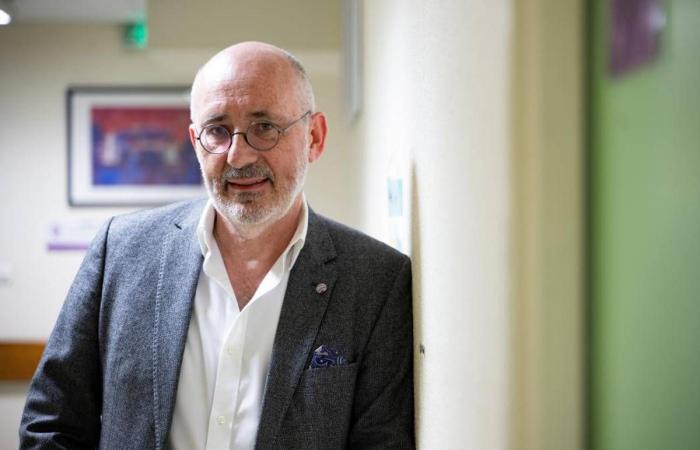There are millions who want to quit smoking but relapses are common. Tobacco remains a trap from which it is difficult to escape, as evidenced by all those who wish to take up the challenge this month of Tobacco Free Month. Several smokers from Puy-de-Dôme testify to their daily struggle against this stubborn addiction. Between failures, relapses… and hopes of liberation.
“It’s in the head. » While pointing his index finger to his forehead, he convinces himself: “I know I will stop one day. » Bruno is a well-known cafe owner on Place Saint-Pierre in Clermont-Ferrand. He lives at 2,000 an hour. This workaholic smoked his first cigarette at 14. “I tried to stop twenty-five times,” he says at the edge of the counter, ready to return to the room to serve a coffee. He mentions thousands of euros spent each year to quit smoking. It once worked with “laser acupuncture”. It lasted a month and a half.
Of the 1.4 million smokers in the Auvergne-Rhône-Alpes region, more than half plan to quit, according to national data
. A quest strewn with failures. We have collected testimonies from these addicts who always relapse.
A break synonymous with recovery
This is also the case for Juliette. She is 26 years old and is working in communications. This Clermontoise has been smoking since 2018. She relapsed last June, after a year of stopping. “I left my boyfriend, he left me a package before leaving, I smoked… and I dove again. I can’t explain it to myself. It’s stupid,” she admits. She now consumes almost a packet a day. The separation is also the cause for Lætitia, also from Clermont.
This young thirty-year-old started at the age of majority. “I stopped for love at 20, and I went ten years without really smoking,” explains this home help, who still admits “a cigarette here and there in the evening.”
“I separated two and a half years ago. I resumed almost immediately. » empty
(empty)
Since then, she has gone through several phases: from occasional “taxer” to evening consumer, to now becoming a “daily smoker”. “I try to stop, but it’s impossible, there’s always something that makes me relapse,” she says, referring to “a bout of stress,” “a strong emotion,” “an evening”… She says to herself today “completely a slave”. It’s a dead end.
“I wanted to take one again, to see”
A dead end also for Lucie, a caterer in the Auvergne city, with two decades of smoking behind her. “I tried every possible technique imaginable: hypnosis, acupuncture, patches, electronic cigarettes. » Nothing happened. Not even this “laser treatment in the ears.” » Well, yes, there was a small exception, ten years ago. She managed to last a year. “I think I was more determined,” she confides, speaking of “the surroundings, the context of life…” How did she relapse? By “stupidity”. Tobacco-free month.
All the information on tabac-info-service.fr. 39 89, free telephone support service with tobacco specialists.
Maybe a little out of pride too. “I wanted to take one again to see, telling myself that it would have no effect. » She was wrong. She dove again.
Megan never stopped. Above all, she never managed to overcome her addiction. The Issoirienne, who is not yet 30, smokes rolled cigarettes. We are talking here about a 40 gram packet “every four to five days”.
It’s a lot. But she says she is trapped. However, putting an end to years of smoking obsesses him, “for financial reasons and also for (his) health”, not in good shape. She has never managed to go more than a day without smoking since she was 18. “I feel like a prisoner, I don’t see a solution,” the Puydômoise despairs.
Solutions and support that she could find during this Tobacco-Free Month, in particular thanks to Tabac info service and its help number, 39.89.
Data from the “Tobacco in Auvergne Rhône-Alpes” file. Regional data from the 2021 barometer”, published in July 2023.
Erwan Rousseau
Photos Florian Salesse
“Any progress towards stopping, no matter how small, counts”
Professor Georges Brousse, head of department at Clermont-Ferrand University Hospital. Photo Fred Marquet Head of department at Clermont-Ferrand University Hospital, Professor Georges Brousse, doctor specializing in addiction, enlightens us on the mechanisms of tobacco dependence and the steps necessary to free ourselves from it.
Does No Tobacco Month work? “The data shows that when you have a one-month break, you are three times more likely to stop.
However, it is often difficult to quit smoking. Addictions, whatever they may be, are chronic illnesses. A person addicted to tobacco will often have to try to quit several times. On average, you have to try it five times to really succeed.
What are your tips?
The first rule: don’t get discouraged. The second: any progress, no matter how small, counts. Each effort represents progress in the fight against addiction. You must have the morale and the ability to fight. The rise in tobacco prices on January 1st satisfies no one
How do you explain this dependence? Addiction is a loss of control and an impaired capacity for self-control. In our brain, areas manage the ability to control our behaviors, particularly our relationships with food, screens, etc. In addicted people, this area is dysregulated under the effect of a neurotransmitter called dopamine. The addicted person ends up automating the intake of the product, to the point of consuming without even realizing it.
How can we get out of this? We have to deautomate behaviors, which is very difficult. There is a very ingrained habit, associated with a reward. This automation is even more difficult to counter when it is linked to external elements, such as morning coffee or passing a tobacco shop…
Concretely, how is this disease treated?In addiction, it’s not just about medications. We must also work on the psychology of the individual and his environment: never one without the other. Patches are also a great help: they are nicotine substitutes which provide a dose of nicotine that patients need. It’s not miraculous, but nothing is in medicine. It helps, and it works. »
Health







